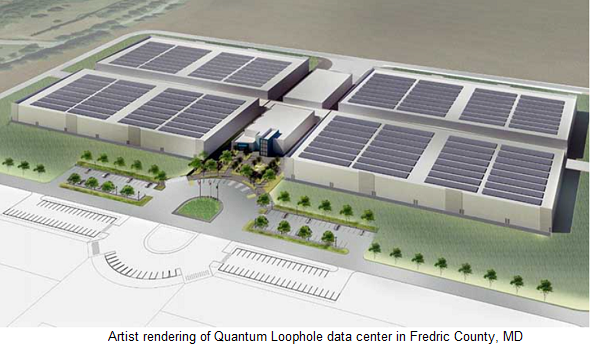In June 2021, Quantum Loophole, Inc. and TPG Real Estate Partners (TREP) announced a strategic joint venture to acquire and develop an innovative, first-of-its-kind, gigawatt (GW) scale data center community in Frederick County, MD. As part of the joint venture, TREP will hold a minority stake in Quantum Loophole.
TREP is helping to fund Quantum Loophole’s purchase of an approximately 2,100-acre property in Frederick County, MD, formerly home to the Alcoa Eastalco Works, an aluminum smelting plant.
The opportunity, and the challenge, is that big data centers are getting bigger. Demand for cloud-based services offered by hyperscalers such as Amazon, Microsoft, Google, and Facebook continues to escalate. This demand is spurring expansion of existing, and the creation of new, data center campuses throughout key markets domestically and internationally.
According to a recent report from Cushman and Wakefield, the D.C-Northern Virginia data center cluster is the largest in the world, as measured by power consumed, exceeding 1600 megawatts (MW) or 1.6 GW. That level is nearly double London and Tokyo, the respective second- and third-ranked markets.
The report highlights a significant trend in how data centers markets are developing. “Historically, data center markets emerged when telecom companies – and later, colocation operators – built the first facilities and established footholds. But today, many of the hyperscalers that dominate cloud, network and internet services can enter a new or relatively immature market and simply begin a major build,” the report says.
Fiber carriers now are following the hyperscalers to provide the required high-speed, low latency connectivity wherever these data centers are located.
A first of its kind, Quantum Loophole is a master planned, clean cloud community. Quantum Loophole’s Maryland site is being planned as an extension of the Northern Virginia market. The Frederick County site is about 20 miles north of Ashburn, VA, the key regional connectivity hub. That proximity puts the Maryland data center campus within one millisecond of Northern Virginia’s extensive internet ecosystem via fiber networks.
Starting with one GW of power capacity, Quantum Loophole anticipates that a series of 30- to 120-mW capacity data center modules can be deployed in less than nine months. At the same time, the site will include construction of a massive and robust fiber ring with regional interconnection points that enable large-scale traffic flows for hyperscale, telecom, and Enterprise clients.
From its previous use, the site already has a large utility power feed. Moreover, Quantum Loophole is planning new approaches to backup power and network management. The campus will include a “battery farm” to offer large-scale energy storage. In addition, a robotic cross-connect system will automate interconnections within each data center.
“Demand for cloud computing and cloud-based services has grown rapidly over the past decade, and Frederick County is an important growth outlet for the Northern Virginia data center market,” said Ty Newell, Managing Director at TREP. “With industrial zoning and access to significant power capacity, the development site will offer several benefits to a fast-growing hyperscale tenant base that is intensely focused on speed of delivery.”
“Partnering with TREP strengthens our vision, setting us firmly on the path to build the first-ever, mass-scale gigawatt data center community,” commented Josh Snowhorn, Founder and CEO of Quantum Loophole. “This project marks the first comprehensive approach to data center development inclusive of environmental impact, efficiency in power use and distribution, fiber connectivity, and a streamlined approach to construction. Quantum Loophole’s approach enables cost efficiencies, expedited time to market, and a revolutionary and industry-leading commitment to sustainability for hyperscale data center developments.”
Quantum Loophole and TREP are committed to developing the master planned data center in a way that enables the most advanced computing technology, benefits local communities, and respects the environment.
By John Celentano, Inside Towers Business Editor





Reader Interactions